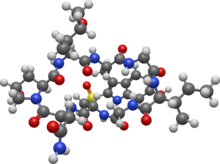γ-Amanitin
 | |
 | |
| Identifiers | |
|---|---|
3D model (JSmol)
|
|
| ChemSpider | |
PubChem CID
|
|
| UNII | |
CompTox Dashboard (EPA)
|
|
| |
| |
| Properties | |
| C39H54N10O13S | |
| Molar mass | 902.97 g/mol |
Except where otherwise noted, data are given for materials in their standard state (at 25 °C [77 °F], 100 kPa).
| |
γ-Amanitin (gamma-Amanitin) is a cyclic peptide of eight amino acids. It is an amatoxin, a group of toxins isolated from and found in several members of the mushroom genus Amanita, one being the death cap (Amanita phalloides) as well as the destroying angel, a complex of similar species, principally A. virosa and A. bisporigera. The compound is highly toxic, inhibits RNA polymerase II, disrupts synthesis of mRNA, and can be fatal.[1]
Toxicity
[edit]Amatoxins selectively inhibit Eukaryotic RNA polymerase II by tightly to the enzyme and severely inhibits translocation along the DNA template; thus the synthesis of mRNA and proteins stops.[2] Amatoxin consumption is characterized by a long asymptomatic period of a few hours (up to a day or more) followed by quick physiological decline due to acute hepatic and tubular necrosis.[3] γ-Amanitin has been found to have similar levels of toxicity to other amatoxins such as α-Amanitin.
See also
[edit]References
[edit]- ^ PubChem. "Hazardous Substances Data Bank (HSDB) : 3460". pubchem.ncbi.nlm.nih.gov. Retrieved 2024-05-04.
- ^ de Mercoyrol, L.; Job, C.; Job, D. (1989-02-15). "Studies on the inhibition by alpha-amanitin of single-step addition reactions and productive RNA synthesis catalysed by wheat-germ RNA polymerase II". The Biochemical Journal. 258 (1): 165–169. doi:10.1042/bj2580165. ISSN 0264-6021. PMC 1138336. PMID 2467661.
- ^ Vetter, János (2023-08-07). "Amanitins: The Most Poisonous Molecules of the Fungal World". Molecules (Basel, Switzerland). 28 (15): 5932. doi:10.3390/molecules28155932. ISSN 1420-3049. PMC 10421264. PMID 37570902.

